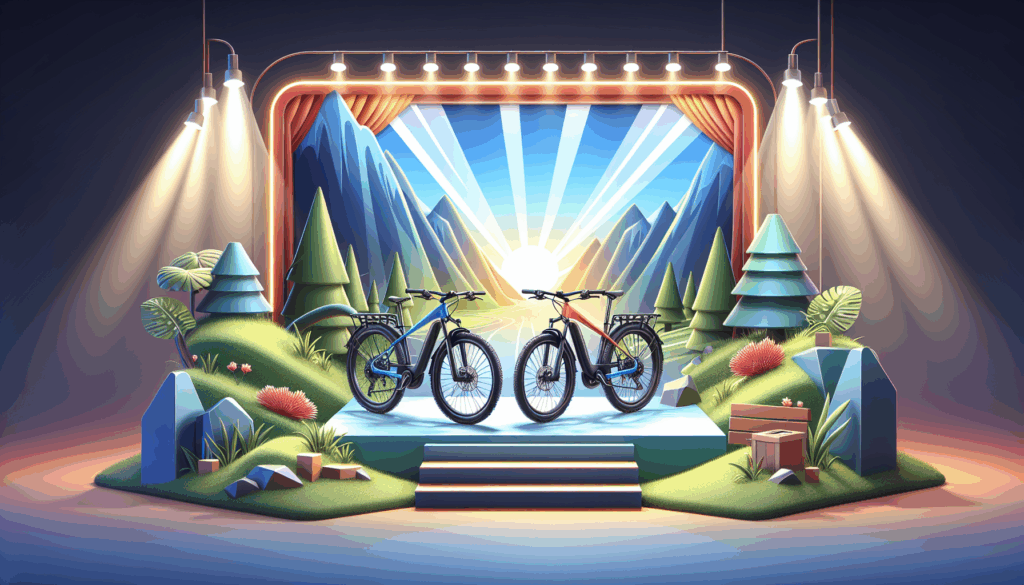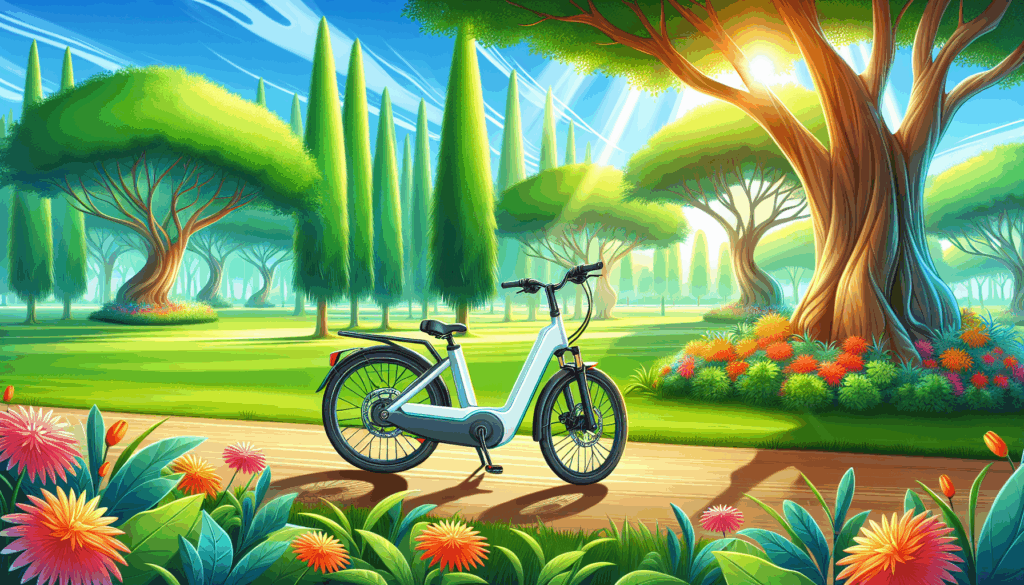
In the rapidly evolving world of electric bicycles, riders are often faced with the difficult choice of selecting the best model to meet their needs. Two standout contenders in this arena are the Engwe M20 electric bicycle and Engwe P20 electric bicycle, both offering unique features and specifications that cater to different riding preferences. The Engwe M20 boasts impressive capabilities with options for electric and moped modes, a robust lithium-ion battery, and fat tires designed for stability and comfort.
On the other hand, the Engwe P20 presents itself as a lightweight and foldable alternative, providing remarkable range and ease of transport. In this blog, we will delve deeper into the specifications, benefits, and potential drawbacks of these two electric bicycles titans to help you make an informed decision.
Overview of Engwe Electric Bicycles
Engwe Electric Bicycles have been making waves in the e-bike market, capturing the attention of cycling enthusiasts and casual riders alike. With their commitment to quality and innovation, Engwe offers a range of models designed for various needs and preferences.
Two of the most talked-about models are the Engwe M20 electric bicycle and Engwe P20 electric bicycle, both equipped with multiple electric assist modes to enhance the riding experience. The M20 features a robust 48V 13Ah Lithium-Ion battery, enabling a remarkable range of up to 60KM in moped mode, while the lightweight P20, with a 36V 9.6Ah battery, provides a range of 80-100KM thanks to its efficient pedal assist system. This versatility ensures that riders can select the best option based on their commuting or recreational needs.
Both bicycles are designed to accommodate a maximum load of 120kg, making them suitable for a variety of riders. The Engwe M20 boasts a heavier build at 42kg but compensates with its durable chain system and Shimano 7 gear transmission for a smooth ride on various terrains. On the other hand, the Engwe P20, weighing just 18.5kg, features a foldable frame that enhances portability and convenience. Additionally, hydraulic and mechanical disc brakes on the P20 and M20 respectively ensure optimal stopping power, enhancing safety for all riders. Whether you prefer the rugged features of the M20 or the lightweight convenience of the P20, Engwe Electric Bicycles are paving the way for a sustainable, energy-efficient future in cycling.
Key Specifications Comparison
When comparing the Engwe M20 and Engwe P20 electric bicycles, it becomes evident that both models offer unique features catering to different needs.
The Engwe M20 is equipped with a robust 48V 13Ah lithium-ion battery that allows for two power settings, providing an electric range of up to 35KM in electric mode and 60KM in moped mode with pedal assist. On the other hand, the Engwe P20 features a slightly lower capacity 36V 9.6Ah battery, with an electric range of 30-35KM. However, it shines in moped mode, offering an impressive 80-100KM with pedal assist, making it more suitable for longer rides. Both bicycles support a maximum load of 120kg, but the M20 is heavier at 42kg, compared to the lightweight P20, which weighs only 18.5kg, further enhancing its portability, especially with its foldable frame design.
In terms of braking and transmission, the Engwe M20 utilizes mechanical disc brakes and a Shimano 7 gears chain system, great for reliability and ease of ride under various conditions. Conversely, the P20 comes equipped with hydraulic disc brakes for superior stopping power and a belt system for a smoother ride. The difference in tyre size also plays a significant role; the M20’s fat tires (20 x 4.0 inch) provide better traction on uneven surfaces, whereas the P20’s slimmer tires (20 x 1.95 inch) cater to city commuting. Both bicycles offer exceptional features, but the choice ultimately depends on the user’s preference for durability, portability, and specific riding requirements.
Assist Modes: M20 vs P20
When it comes to assist modes, both the Engwe M20 and Engwe P20 offer three different levels of electrical assistance to cater to varying riding styles and terrains. The M20 excels in performance with a range of 35KM in pure electric mode and a remarkable 60KM in moped mode with pedal assist. This versatility allows riders to enjoy extended trips without the worry of depleting battery power quickly, making it ideal for adventurous commutes. Additionally, the M20 features a robust 48V 13Ah Lithium-Ion battery, providing the kind of power necessary for tackling more intense riding demands.
On the other hand, the Engwe P20, while offering a slightly shorter range of 30-35KM in electric mode, triumphs in pedal assist with an impressive reach of 80-100KM. Its 36V 9.6Ah Li-ion battery combines efficiency with lightweight design, weighing just 18.5kg, which makes it a more agile option for urban navigation. With both bicycles providing unique qualities in their assist modes, the choice ultimately hinges on individual preferences—whether you prioritize power and versatility of the M20 or the compact, efficient design of the P20, there’s an electric bicycle suited perfectly for you.
Performance and Range: Which Bike Reigns Supreme?
When it comes to performance and range, both the Engwe M20 electric bicycle and Engwe P20 electric bicycle showcase impressive capabilities, but they cater to different needs. The Engwe M20 boasts a robust 48V 13Ah Lithium-Ion battery that provides a range of 35 kilometers in electric mode and up to 60 kilometers in moped mode with pedal assist. Its maximum load capacity of 120kg and Shimano 7-speed transmission allows riders to tackle various terrains confidently, making it an ideal choice for those seeking a sturdy bike for mixed-use. With its mechanical disc brakes and solid 20 x 4.0 inch fat tires, the M20 merges performance with stability for an exceptional riding experience.
In contrast, the Engwe P20 offers a lightweight design at only 18.5 kilograms, powered by a 36V 9.6Ah Li-ion battery, which sustains a range of up to 35 kilometers in electric mode and 80-100 kilometers in moped mode. This bike also supports a maximum load of 120kg but features a belt system that ensures smoother transitions while riding. The P20’s foldable frame and hydraulic disc brakes make it a convenient option for city commuting and storage. Overall, while the M20 excels in durability and off-road capability, the P20 stands out for its portability and urban efficiency, allowing each bike to reign supreme in its own right.

Comfort and Design: Exploring Frame and Weight
When it comes to comfort and design, the Engwe M20 and Engwe P20 electric bicycles offer distinctive features that cater to different preferences. The M20, weighing in at 42kg, boasts a robust chain system and larger 20 x 4.0 inch fat tires, providing added stability and comfort over rough terrains. Its solid build is designed for riders seeking a rugged and durable experience, making it ideal for adventurous outings. The M20’s mechanical disc brakes ensure reliable stopping power, further enhancing its performance for long-distance trips, even under varying conditions.
On the other hand, the Engwe P20 is more lightweight at just 18.5kg, making it exceptionally portable and easy to maneuver. Its foldable frame adds to its practicality, appealing to urban commuters who require convenience when storing or transporting their electric bicycle. The P20’s 20 x 1.95 inch tires, paired with a belt system and hydraulic disc brakes, provide a smooth ride on city roads. This bike prioritizes ease of use and agility, perfect for day-to-day travel while still delivering an enjoyable cycling experience.
Braking Systems: Mechanical vs Hydraulic
When it comes to braking systems, the Engwe M20 electric bicycle features mechanical disc brakes, while the Engwe P20 electric bicycle is equipped with hydraulic disc brakes. Mechanical disc brakes use a simple cable system to actuate the brake calipers, which provides adequate stopping power for most conditions, especially on tougher terrains. This system is generally easier to maintain and replace parts, making it a suitable choice for casual riders looking for a reliable experience without the complexity of hydraulic systems. The Engwe M20’s mechanical brakes ensure that riders have enough stopping force, especially with its robust design aimed at supporting a maximum load of 120kg.
On the other hand, the Engwe P20’s hydraulic disc brakes offer superior stopping power and modulation, making them ideal for more aggressive riding styles or varying terrains. Hydraulic brakes utilize fluid to transfer force from the brake lever to the calipers, resulting in a much smoother performance and less effort needed from the rider to achieve significant deceleration. With its lightweight frame and a maximum load of 120kg, the P20 is designed for efficiency, and the hydraulic brakes enhance its responsiveness, contributing to an overall superior riding experience in urban or adventurous settings.
The choice between these two systems ultimately depends on the rider’s specific needs, with one emphasizing simplicity and reliability, while the other focuses on performance and control.
Tire Options: Fat Tires vs Standard Tires
When comparing the Engwe M20 and the Engwe P20 electric bicycles, tire options play a crucial role in determining performance and ride comfort. The Engwe M20 comes equipped with robust 20 x 4.0 inch fat tires, designed to provide superior traction and stability. These larger tires are ideal for diverse terrains, absorbing shocks effectively, making it an excellent choice for off-road rides or uneven surfaces. This design enhances overall ride comfort and stability, especially for heavier loads, as the fat tires offer better weight distribution and grip, ensuring riders can enjoy their journeys with confidence.
Conversely, the Engwe P20 features standard 20 x 1.95 inch tires that are lightweight and geared more towards smooth, urban environments. While these tires may not provide the same level of traction as the fat tires of the M20, they offer advantages in speed and maneuverability, making them suitable for city commuting. The foldable frame and lighter weight of the P20 also mean that portability is a significant advantage without sacrificing much in riding quality. Ultimately, the choice between fat tires and standard tires comes down to personal riding needs; whether you prefer adventure-oriented durability or sleek city efficiency will guide your preference for the Engwe model.
Price Analysis: Value for Money
When it comes to purchasing an electric bicycle, price plays a significant role in determining its value for money. The Engwe M20 is priced at RM 5,499, reflecting its robust features such as a dual 48V 13Ah Lithium-Ion battery system, which provides a solid electric range of up to 35KM and even 60KM in Moped mode with pedal assist. Additionally, its Shimano 7-speed transmission and mechanical disc brakes enhance the riding experience, making it an excellent choice for those looking for durability and performance in their urban commute. With a maximum load of 120kg and fat tires that ensure stability, the M20 caters well to cyclists looking for a reliable option in diverse riding conditions.
In contrast, the Engwe P20 comes at a more budget-friendly price of RM 4,899, appealing to riders who might prioritize portability and lightweight design. Weighing just 18.5kg, it’s easier to manage and its foldable frame adds to its portability, making it perfect for those on the go. Despite offering slightly less range in electric mode (30-35KM) and a maximum of 100KM in Moped mode, it features a hydraulic disc brake and a belt system that requires less maintenance. Thus, for electric bicycle enthusiasts seeking a balance between cost and functionality, both models present distinct advantages that could justify their price tags depending on your individual needs.

Deciding Between the Engwe M20 and Engwe P20: Which Electric Bicycle is Right for You?
In the end, choosing between the Engwe M20 and Engwe P20 comes down to your specific needs and preferences as a rider. The Engwe M20 boasts impressive specifications, such as a range of 35 km in electric mode, a sturdy 48V 13Ah lithium-ion battery, and fat tires designed for stability and comfort. Its maximum load capacity of 120 kg makes it suitable for heavier riders or those wanting to carry additional gear. However, it comes with a heavier weight of 42 kg and a higher price tag of RM 5,499, which may not appeal to everyone.
On the other hand, the Engwe P20 offers a light and portable solution with its foldable frame, making it an excellent choice for commuters or those with limited storage space. With an 80-100 KM range in moped mode and a slightly lower price point of RM 4,899, the P20 may be ideal for riders seeking versatility without compromising on performance. Ultimately, both electric bicycles embody quality and innovation, so consider your riding style, budget, and the type of terrain you’ll be navigating as you make your choice.

I’ve been considering getting an e-bike for my daily commute and this comparison is super helpful!
Hi Zoey, thank you for your comment! I’m glad you found our comparison of the Engwe M20 and Engwe P20 electric bicycles helpful. Both e-bikes have their unique features and are suitable for different riding requirements. If you’re looking for a versatile e-bike for your daily commute, I’d be happy to help you decide between the M20 and P20 based on your specific needs and preferences. Feel free to contact us at [email protected] or +60 3-7890 3042 for a personalized consultation.
I’ve seen both models before but never knew they had such different features. Thanks for breaking it down!
Hi Kavitha, we’re glad you found the comparison helpful. If you have any specific questions or need further clarification on either model, please don’t hesitate to reach out. We’re always here to help. Feel free to contact us via [email protected] or +60 3-7890 3042 for any inquiries.
Planning an off-road adventure this year. The Engwe M20 seems like a winner, looking forward to trying it!
Dear Ahmed, congratulations on planning an exciting off-road adventure! The Engwe M20 is indeed a capable e-bike for tackling tough trails. Its fat tires and robust battery make it an ideal choice for navigating through challenging terrain. If you have any questions about the Engwe M20 or need assistance, please don’t hesitate to contact us at [email protected] or give us a call at +60 3-7890 3042. Happy trails!